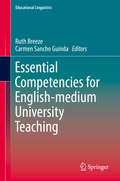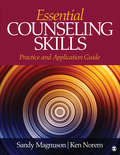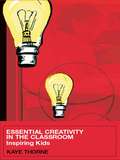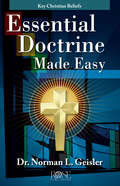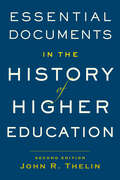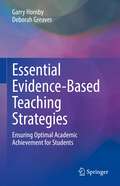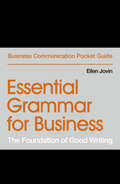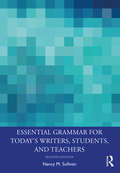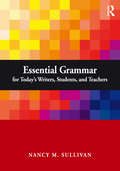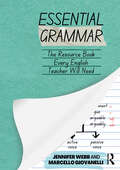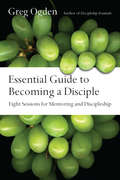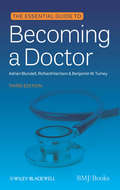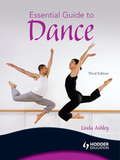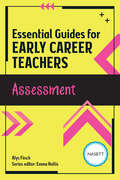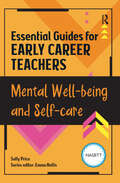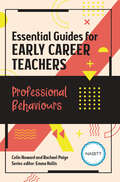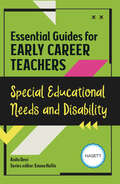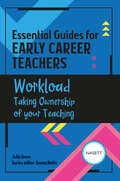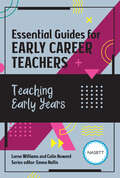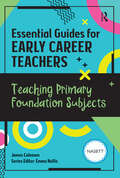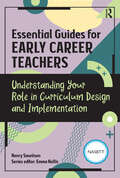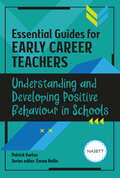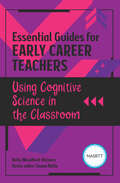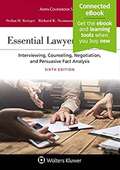- Table View
- List View
Essential Competencies for English-medium University Teaching
by Carmen Sancho Guinda Ruth BreezeAs English gains prominence as the language of higher education across the world, many institutions and lecturers are becoming increasingly concerned with the implications of this trend for the quality of university teaching and learning. With an innovative approach in both theme and scope, this book addresses four major competencies that are essential to ensure the effectiveness of English-medium higher education: creativity, critical thinking, autonomy and motivation. It offers an integrated perspective, both theoretical and practical, which defines these competences from different angles within ELT and Applied Linguistics, while also exploring their points of contact and applications to classroom routines. This approach is intended to provide practical guidance and inspiration, in the form of pedagogical proposals, examples of teaching practice and cutting-edge research by scholars and university teachers from all over the world. To that end, a leading specialist in the field introduces each of the four competencies, explaining concepts accessibly and synthetically, exposing false myths, presenting an updated state of the art, and opening windows for future studies. These introductions are followed by practitioner chapters written by teachers and scholars from different cultures and university contexts, who reflect on their experience and/or research and share effective procedures and suggestions for the university class with English as a vehicle for instruction.
Essential Counseling Skills: Practice and Application Guide
by Sandy Magnuson Ken NoremEssential Counseling Skills: Practice and Application Guide offers practical, step-by-step guidance for developing and applying the skills necessary for careers in counseling. Using the metaphor of a professional journey, this guide provides commentary and background information throughout, as readers are directed in their development of such key counseling skills as empathy, building relationships, case conceptualization, and facilitating change. Deep reflection is further encouraged at every key stage through the integration of theory with a wealth of applied exercises and examples.
Essential Creativity in the Classroom: Inspiring Kids
by Kaye ThorneEssential Creativity in the Classroom is about giving all children the opportunity to fulfil their potential. It is about developing real partnerships between parents, teachers, businesses and the community, identifying best practice, finding teachers that are inspiring and schools that are committed to providing a special learning experience. This is a book to inspire, excite and stimulate creative approaches to learning. Without creativity, we have no real innovation; we need people who are capable of thinking crazy, out of the box thoughts; we need people who shake us out of complacency. This book covers in detail topics such as: What do teachers need to do to help children make the most of their creativity? How do children prefer to learn? What can teachers do to stimulate children’s creativity? building self-esteem, helping individuals to believe in themselves supporting a young person in making creative career choices. Packed with proven practical advice this dip-in guide identifies the best ways of supporting pupils as they navigate their exciting journey through a world of learning and discovery.
Essential Doctrine Made Easy
by Norman L. GeislerEssential Doctrine Made Easy - Key Christian BeliefsWhat are the basic doctrines of the Christian faith? Essential Doctrine Made Easy ebook outlines and explains 14 key beliefs embraced by believers around the world, such as Christ's Virgin Birth, Atoning Death, and Bodily Resurrection. This bestselling ebook looks at each doctrine and asks two essential questions:* "What Do I Actually Need to Believe?"* "What Is At Stake Here?" Essential Doctrine Made Easy will also show you where to find the answers in the Bible. The ebook also includes a glossary of Christian terms, a chart showing how other religious groups treat these essentials, and much more.What are the core teachings of the Bible that have defined Christianity for more than 2,000 years? This bestselling ebook outlines and explains:* God's unity - There is only one God* God's triune nature - One God in three Persons* Christ's virgin birth* Human depravity - No one can win God's favor by their own efforts* Christ's sinlessness* Christ's deity* Christ's humanity* Necessity of God's grace* Necessity of faith* Christ's atoning death* Christ's bodily resurrection* Christ's bodily ascension* Christ's intercession* Christ's second comingEach doctrine is examined by answering specific essential questions. For example:The Doctrine: Christ's atoning deathThe penalty for sin is death--not only physical death (separation of the soul from the body), but also spiritual death (separation of ourselves from God). The penalty we owe to God was paid by Christ through his death on the cross. The acceptable payment had to be perfect, complete, and without fault. Christ, the perfect Man, gave Himself in our place, so that whoever believes in Him will not die (physically and spiritually) but have everlasting life (John 3:16).Question One: What Do I Actually Need to Believe?Only Christ's sinless life, sacrificial death and bodily resurrection can bring us to God.Question Two: What's at Stake Here?The unique nature of Jesus' work of salvation.Reference Scriptures:* For even the Son of Man did not come to be served, but to serve, and to give his life as a ransom for many. - Mark 10:45* He himself bore our sins in his body on the tree, so that we might die to sins and live for righteousness. - I Peter 2:24* For Christ died for sins once for all, the righteous for the unrighteous, to bring you to God. - I Peter 3:18* No one comes to the Father except through me. - John 14:6What do other religions believe?An easy-to-use chart shows how four other religious groups treat the 14 essentials. A key indicates whether the group accepts, redefines or denies each doctrine, enabling the reader to understand the controversies regarding these religious sects. Other religious groups include:* Latter Day Saints (Mormonism)* Jehovah's Witnesses (Watchtower)* Scientology* Christian ScienceEssential Doctrines Made Easy also addresses belief in the inspiration of Scripture and the methods of interpretation, which are important to faith, although not a necessary factor in salvation.Four ancient creeds of the early Church are summarized in the ebook, giving an historical overview of what the Church deemed most essential. These creeds include:* The Apostles' Creed* The Nicene Creed* Athanasian Creed* The Creed of ChalcedonA glossary of Christian terms is included, defining 24 terms which are widely used but not always understood, such as orthodoxy, mediator, grace, deity, and soteriology.
Essential Documents in the History of American Higher Education
by John R. ThelinThe thoroughly updated second edition of this dynamic and thoughtful collection focuses on the issues that have shaped American higher education in the past decade.Essential Documents in the History of American Higher Education, designed to be used alongside John R. Thelin's A History of American Higher Education or on its own, presents a rich collection of primary sources that chart the social, intellectual, political, and cultural history of American colleges and universities from the seventeenth century to the present. The documents are organized in sections that parallel the chapters in A History both chronologically and thematically, and sections are introduced with brief headnotes establishing the context for each source.This updated edition of Essential Documents focuses on the issues that have shaped American higher education in the past decade, from congressional investigations into endowments and court cases about paying student-athletes to accounts of campus protests over racial discrimination and adjuncts struggling in the "gig economy." From the successful fund-raising campaigns of 2014 to the closing of campuses because of the COVID-19 pandemic of 2020, the book also includes• a new tenth chapter, "Prominence and Problems: American Higher Education since 2010," and an updated introduction;• a number of landmark documents, including the charter for the College of Rhode Island (1764), the Morrill Land Grand Act (1862), the GI Bill (1944), and the Knight Commission Report on College Sports (2010); and • lively firsthand accounts by students and teachers that tell what it was like to be a Harvard student in the 1700s, to participate in the campus riots of the 1960s, to be a female college athlete in the 1970s, or to enroll at UCLA as an economically disadvantaged Latina in the 1990s.Thelin even stretches the usual bounds of documentary sources, incorporating popular pieces by Robert Benchley and James Thurber on their own college days as well as an excerpt from Groucho Marx's screwball film Horse Feathers. What emerges is a complex and nuanced collection that reflects the richness of more than three centuries of American higher education.
Essential Elements of Portrait Photography
by Bill IsraelsonCreating an idealized image of a subject is a portrait photographer's job. However, the approach is not quite formulaic. From one subject to the next and one day to the next, there are different goals and scenarios-on Monday, you may be tasked with photographing your subjects under cloudy skies on a beach; on Tuesday, you may need want to downplay your client's wide hips in the studio; on Wednesday, you may want to create dramatic lighting for an actor's portfolio-on-stage. Every day, there is a unique challenge to meet, often under varying conditions. So, how do you make a magically good portrait during every shoot?In this book, Bill Israelson shows you how to tackle the problem of creating a great portrait of your every client. Beginning with a discussion on equipment essentials, breaking the discussion into two topics-gear for studio work and portable equipment for location work.Next, you'll learn simple posing strategies for making women, men, kids, and groups looks their best in any presentation. You'll learn how to position the body from head to toe to maximize assets and downplay common problem areas.Lighting is the backbone of every image. In the studio, you have complete control over every facet of the lighting-from its hardness or softness to its color temperature and direction. On location, the basic principles of good lighting still apply-but the quality and quantity of light is subject to change. Israelson shows you how to harness the available light and supplement it when needed to create saleable images every time.With straightforward, jargon-free text and a wide range of image examples, this book will help you quickly learn how to improve your portrait results to create client-pleasing portraits every time.
Essential Evidence-Based Teaching Strategies: Ensuring Optimal Academic Achievement for Students
by Garry Hornby Deborah GreavesThis book examines evidence-based practices that facilitate effective teaching to ensure optimum educational achievement for school-age students. It identifies key strategies with extensive research evidence that confirms their effectiveness in improving student outcomes. The book offers guidelines for teachers to use in distinguishing between strategies that are evidence-based and those with little or no supporting evidence. It describes common instructional strategies often found in schools despite having little evidence to support their effectiveness. In addition, the book identifies eight key evidence-based teaching practices that can be directly implemented by classroom teachers, reviews the theoretical and research base of each of these strategies, and provides guidelines for special and general education teachers on how to apply them most effectively, with links to video examples of their use in classrooms. The text also examines common barriers to the use of evidence-based practices in schools. It explores implications for teacher education, focusing on training educators to identify and implement evidence-based strategies effectively, avoiding those lacking evidence, even if they are popular in schools. Essential Evidence-Based Teaching Strategies is a must-have resource for researchers, professionals, and graduate students in educational psychology, child and school psychology, and social work who are interested in learning about and implementing effective teaching methods that improve student engagement and academic achievement, strengthen social-emotional learning, and reduce school dropout rates.
Essential Grammar for Business: The Foundation of Good Writing (Business Communication Pocket Guides)
by Ellen JovinReliable, authoritative, and designed to ease grammar anxiety!Words are the currency of every business transaction. They persuade, inspire, educate and clarify. Essential Grammar for Business offers guidance to professionals perplexed by proper comma placement, dangling modifiers or the difference between who and whom. With a better understanding of the building blocks, readers will be better equipped to focus on the other ingredients of good business writing such as content, clarity and style. This book is fun, fast-paced, and easy to use.
Essential Grammar for Today's Writers, Students, and Teachers
by Nancy M. SullivanThis innovative grammar text is an ideal resource for writers, language students, and classroom teachers who need an accessible refresher in a step-by-step guide to essential grammar. Rather than becoming mired in overly detailed linguistic definitions, Nancy Sullivan helps writers and students understand and apply grammatical concepts and develop the skills they need to enhance their writing. Along with engaging discussions of both contemporary and traditional terminology, Sullivan's text provides clear explanations of the basics of English grammar and a practical, hands-on approach to mastering the use of language. Complementing the focus on constructing excellent sentences, every example and exercise set is contextually grounded in language themes. This updated edition includes new sections in each chapter on Writing Matters (addressing key tools and concerns for writers) and Language Varieties (addressing issues of social and regional dialect variation). This is an ideal textbook for any writing course across disciplines where grammatical precision is important. Online resources including additional exercises, links, and an answer key are available at Routledge.com/9780367148683. Instructor materials accompanying the text provide teachers with activities designed for face-to-face, hybrid, and online instruction to enliven these basic grammar lessons as well as writing activities to integrate these concepts into students' own writing.
Essential Grammar for Today's Writers, Students, and Teachers
by Nancy SullivanThis innovative grammar text is an ideal resource for writers, language students, and current and future classroom teachers who need an accessible "refresher" in a step-by-step guide to essential grammar. Rather than becoming mired in overly detailed linguistic definitions, Nancy Sullivan helps writers and students understand and apply grammatical concepts and develop the skills they need to enhance their own writing. Along with engaging discussions of both contemporary and traditional terminology, Sullivan's text provides clear explanations of the basics of English grammar and a highly practical, hands-on approach to mastering the use of language. Complementing the focus on constructing excellent sentences, every example and exercise set is contextually grounded in language themes. Teachers, students, and writers will appreciate the streamlined, easy-to-understand coverage of essential grammar, as well as the affordable price. This is an ideal textbook for future teachers enrolled in an upper-level grammar course yet is also suitable for any writing course across disciplines where grammatical precision is important. Instructor materials accompanying the text provide teachers with activities designed for face-to-face, hybrid, and online instruction to enliven these basic grammar lessons as well as writing activities to integrate these concepts into students' own writing.
Essential Grammar: The Resource Book Every Secondary English Teacher Will Need
by Marcello Giovanelli Jennifer WebbWhat is grammar? Why is it so central to the teaching of English? How can we teach it with confidence in secondary schools? Essential Grammar will provide clarity, meaning and teacher expertise to this much debated area of the English curriculum. By exploring grammar as applied to literary analysis and using a range of examples from commonly-taught and popular texts, this highly accessible book provides an extensive overview of how to use grammar to enhance the teaching of academic and creative writing. Drawing on a range of resources, best-selling authors Webb and Giovanelli: discuss the context of grammar teaching in schools provide a clear overview of concepts and terminology for the teacher offer a wide range of examples of how grammar can be applied to the analysis of texts and the development of students’ writing debunk the unhelpful view of grammar as a list of prescriptive rules and limits outline grammatical concepts in a way which is clear and simple to understand provide a huge range of practical ways to ensure that teaching of grammatical concepts can be rigorous and successful for all. This resource, with its grounded and straightforward approach to grammar, will be immediately useable in the classroom with strategies that be used by teachers in their classroom today. For any training and practicing secondary English teachers, Essential Grammar will be a compulsory classroom companion.
Essential Guide to Becoming a Disciple: Eight Sessions for Mentoring and Discipleship (The Essentials Set)
by Greg OgdenWhat am I committing to when I say I want to follow Jesus?Discipleship Essentialsa core trutha Bible studya readinglife application
Essential Guide to Becoming a Doctor
by Richard Harrison Adrian Blundell Benjamin W. TurneyAll you need to know about becoming a doctor in the UKThis book contains all the help you need to become a doctor. From applying to medical school through to choosing your specialty, you can find out: How to choose a medical schoolHow to get into medical schoolHow to survive as a medical studentAll about electivesWhat life is like as a doctorAs well as easy to follow information on choosing, getting into - and surviving - medical school, junior doctors in different specialties provide unique insight with firsthand accounts of what the job is like in real life, to help you plan and decide your future career path. Included in this fully updated third edition is the latest information on admission tests, an admission table with practical details about each medical school (as well as greater coverage of graduate medical schools), making this now even more comprehensive for everyone planning a career in medicine.
Essential Guide to Dance, 3rd edition
by Linda AshleyThis third edition of the bestselling text ESSENTIAL GUIDE TO DANCE is thoroughly updated to meet the new AS/A2 specifications and relevant Applied A-levels, BTEC and other Dance qualifications. Now in full colour, highly illustrated, and packed with tasks and activities to cover all aspects of current courses, this text will appeal to both teachers and students.Students are brought right up to date with clear explanations of choreography, performance and appreciation of Dance, as well as recent examples of new set works and choreographers. With further video and photo interactive analysis tasks, the addition of short revision tests and updated professional examples alongside many contemporary photographs, ESSENTIAL GUIDE TO DANCE Third Edition provides students with comprehensive support and guidance.With its emphasis on the practical aspects of Dance and its interactive features that encourage effective learning, ESSENTIAL GUIDE TO DANCE Third Edition will be essential for all students of Dance and their teachers.Linda Ashley has extensive experience as a writer, choreographer, performer and teacher of Dance. Linda is currently Dance Research Leader at AUT University, New Zealand, Linda has written several Dance titles, published in the UK and New Zealand, including the two previous bestselling editions of ESSENTIAL GUIDE TO DANCE, both published by Hodder.
Essential Guides for Early Career Teachers: Assessment (Essential Guides for Early Career Teachers)
by Alys FinchThe Essential Guides for Early Career Teachers provide accessible, carefully researched, quick-reads for early career teachers, covering the key topics they will encounter during their training year and first two years of teaching.This title on Assessment provides a range of practical but critically engaged strategies and approaches to assessment. It offers a brief history of the core ideas and educational philosophy underpinning these, looks at links to planning and reflection, examines the concept of progress over time as a mirror for quality teaching and learning, and explores the idea of pupil self-assessment. Most importantly it recognises that assessment can and should be at the heart of enabling and accelerating the progress of all learners.Clear, accessible and practical. An unmissable guide to classroom assessment.Professor Dame Alison Peacock.
Essential Guides for Early Career Teachers: Mental Well-being and Self-care (Essential Guides for Early Career Teachers)
by Sally McWilliamThe Essential Guides for Early Career Teachers provide accessible, carefully researched, quick-reads for early career teachers, covering the key topics they will encounter during their training year and first two years of teaching. They complement and are fully in line with the new Early Career Framework and are intended to assist ongoing professional development by bringing together current information and thinking on each area in one convenient place.This title on Mental Well-being and Self-care explores these increasingly significant issues for those training to teach or in the early stages of their teaching career. It draws upon a new body of evidence-based knowledge and an emerging lexicon which fosters and supports mentally healthy routines as teaching practice develops. Critical but also practical, the text guides the reader through research-based concepts and reflective tasks central to positive mental health and well-being, supporting early career teachers as they develop their teaching skills and techniques.
Essential Guides for Early Career Teachers: Professional Behaviours (Essential Guides for Early Career Teachers)
by Colin Howard Rachael PaigeThis title outlines the personal and professional skills and behaviours needed to be an effective early career teacher beyond that of your own subject knowledge and class-based practices.It provides guidance on how to gain the most from mentoring conversations and how to develop good habits around workload and managing priorities. It helps you develop and understand the importance of engaging in self-reflection, professional development, building relationships and managing your well-being, encouraging you to consider your professional identity, values and motivators in order to become the best teacher you can be.The Essential Guides for Early Career Teachers provide accessible, carefully researched, quick reads for early career teachers, covering the key topics you will encounter during your training year and first two years of teaching. They complement and are fully in line with the new Early Career Framework and are intended to assist ongoing professional development by bringing together current information and thinking on each area in one convenient place.
Essential Guides for Early Career Teachers: Special Educational Needs and Disability (Essential Guides for Early Career Teachers)
by Anita DeviProvides you with the required knowledge and skills development around special educational needs and disability (SEND) as you progress through your early teaching career. Using an audit tool, the text builds on any previous training enabling you to ground and embed your practice for children and young people presenting with SEND. It recognises the increasing challenges you may face and distils the theoretical into usable techniques in the classroom. Critical but also practical, the text guides you through research-based concepts and reflective tasks central to understanding and supporting issues around SEND.
Essential Guides for Early Career Teachers: Taking Ownership of your Teaching (Essential Guides for Early Career Teachers)
by Julie GreerLinked to the Early Career Framework, this book provides practical time management and productivity strategies to help new teachers tackle the issue of workload.Workload is a key issue for most beginning teachers. Trying to cope with all the demands of a new job with an increasing burden of administration, reporting and assessment tasks, can be daunting at best and may even lead to significant mental health issues. But there is a way through it all! This book acknowledges the challenges that exist and suggests evidence-informed ideas that can be used both in and outside the classroom to create an acceptable workload. It takes a positive and proactive stance, encouraging early career teachers to implement strategies that will enable them to work more effectively and ultimately bring a high level of enjoyment and job satisfaction.
Essential Guides for Early Career Teachers: Teaching Early Years (Essential Guides for Early Career Teachers)
by Colin Howard Lorna WilliamsAimed at all beginning teachers involved in early years teaching.This text looks at the unique role of the early years teacher and outlines how you can support the development of children as unique individuals through an enabling environment, building success through effective relationships, outstanding provision and purposeful assessment. It encourages you to think about your own development in a holistic sense in order to promote outstanding professional practice.The Essential Guides for Early Career Teachers provide accessible, carefully researched, quick reads for early career teachers, covering the key topics you will encounter during your training year and first two years of teaching. They complement and are fully in line with the new Early Career Framework and are intended to assist ongoing professional development by bringing together current information and thinking on each area in one convenient place.
Essential Guides for Early Career Teachers: Teaching Primary Foundation Subjects (Essential Guides for Early Career Teachers)
by James ColemanAs Ofsted introduces a new framework with higher expectations regarding subject knowledge across the primary curriculum, there has never been a more important time for trainees to secure their subject knowledge and improve confidence. This book aims to help early career teachers in teaching primary foundation subjects.This is another text for the Essential Guides for Early Career teachers series and it provides ECT's and their mentors with the right tools for teaching primary foundation subjects, improving their subject knowledge and building understanding. It ensures that relevant theory and research are woven together with real classroom experience. It links to key readings, resources and online sources which will allow trainees to continue their own learning and encourage independent study through the use of reflective exercises and practical tasks to ensure the delivery of the best possible teaching.A text like this is needed more than ever as the Ofsted framework for ITT is explicit in highlighting subject knowledge as being a key component to successful teaching. This book, therefore, covers the kind of topics that ECT's might at first struggle with from art and design, to computing and IT to languages like French and German. This book breaks down each subject and points trainees in the direction of resources, support and best practice.
Essential Guides for Early Career Teachers: Understanding Your Role in Curriculum Design and Implementation (Essential Guides for Early Career Teachers)
by Henry SauntsonThis is a must-read for early career teachers (ECTs), focusing on the role of the ECT in terms of school curriculum design and implementation.It explores the topics surrounding curriculum that those in training or ECT induction are likely to encounter and need to understand, and offers a range of practical and critical strategies and approaches to curriculum design. It begins with examining the history of the core ideas around curriculum, including educational philosophy and concepts, before moving on to planning, reflection and principled intent and implementation. It also delves into the various roles of those involved in curriculum design.This is an essential text for ECTs as curriculum is a key aspect of the Core Content and Early Career Frameworks. It draws on real-life enactments and models to help those in their early stages understand their role in curriculum implementation, especially in relation to the Ofsted focus on the quality of education and the role of all teachers as professionals. Most importantly, this book recognises curriculum as the beating heart of any strong educational offer.
Essential Guides for Early Career Teachers: Understanding and Developing Positive Behaviour in Schools (Essential Guides for Early Career Teachers)
by Patrick GartonBehaviour is the number one concern for most early career teachers so this accessible book provides a range of research informed and road-tested strategies to support the development of positive classroom systems and structures. It offers key psychological insights into the factors that lie behind different behaviours, helping you understand and manage your own behaviours as well as those of the children and young people you teach. Chapters cover understanding individuals, the classroom environment and the wider school context, as well as working with parents and carers. Ultimately the book enables you to successfully work with groups of children and young people so that they can learn effectively and make progress.The Essential Guides for Early Career Teachers series provides accessible, carefully researched, quick reads for early career teachers, covering the key topics you will encounter during your training year and first two years of teaching. They complement and are fully in line with the new Early Career Framework and are intended to assist ongoing professional development by bringing together current information and thinking on each area in one convenient place.
Essential Guides for Early Career Teachers: Using Cognitive Science in the Classroom (Essential Guides for Early Career Teachers)
by Kelly RichensLinked to the Early Career Framework, this book provides an understanding of cognitive load theory and its application to teaching for all those training or new to the job. Cognitive science is fast becoming the cornerstone for understanding how students learn and is revolutionising the way we teach pupils at both primary and secondary levels. The techniques informed by cognitive science are evidence-based and proven to work, providing clear benefits for both the early career teacher and your pupils. This book outlines the principles of cognitive load theory and metacognition so that you can feel in control of your own learning and understand how to harness the learning of your students. It provides concise explanations and practical strategies that you can use in the classroom, enabling you to confidently plan and teach lessons with a reflective, metacognitive approach underpinned by key cognitive science principles.
Essential Lawyering Skills: Interviewing, Counseling, Negotiation, and Persuasive Fact Analysis (Aspen Coursebook Series)
by Stefan H. Krieger Jr. Neumann Renee McDonald HutchinsThe Sixth Edition of Essential Lawyering Skills: Interviewing, Counseling, Negotiation, and Persuasive Fact Analysis continues to emphasize the role of the attorney in the lawyer-client relationship. Widely respected practitioners and teachers, the authors’ introductions, visual aids, and realistic examples illuminate the basic mechanics of these key skills. Case situations and problem-solving scenarios engage students in developing essential lawyering skills that mirror legal practice.The topic of professional responsibility is integrated throughout. <p><p> New to the Sixth Edition: <p> New co-author René Hutchins brings her new perspective to the course <p>Updated and improved design makes the material more accessible for today’s student <p>Increased coverage of negotiation in the plea-bargaining context <p>Updated examination of the use of electronic media in fact analysis and negotiation <p><p>Professors and students will benefit from: <p> <p>An emphasis on practice and the mechanics of negotiation and persuasion, rather than on theory <p>Complete coverage of problem solving, interviewing, counseling, negotiation, and fact analysis <p>Remarkably clear and penetrating discussion of the persuasive value of facts, supported by useful visual aids <p>Generous use of interesting examples that place topics in context <p>Integrated coverage of professional responsibility where appropriate <p>Experienced authors, who draw upon many years of teaching and writing about lawyering skills
